My father used to say something to the effect of - kids these days will never experience in their lifetime the shocking amount of change we had, from having gone from starving in the post-war to such a flourish of technological and social change that ushered the era of capitalist excesses, where the middle-class problems where ones of choice and abundance, of over-consumption.
And, it's true. What could I tell my kids? You didn't live through the era of having to wait for bits to transfer from tape? Not quite as dramatic, isn't it?
In (computer) tech, we have seen such immense, mind-boggling progress, that it's hard to imagine there is anything we can miss from the past - once nostalgia is factored out.
But that's only tech hubris. It's the delusion that the world works by flops and mips and lines of code, instead of meat and minds. Technologies can, and routinely do "peak" - they reach points of excellence never to be seen again.
For this to happen, three conditions have to be true:
1) The market must have shifted. Users, and thus, companies.
2) The technology must be past the point where computational power makes material, qualitative difference to it.
3) The culture must have not shifted so much to make the past artifacts unusable or unrecognizable.
Take gaming: entire genres that used to be mainstream, with fierce competition among companies and teams of tens of people, are now in the realm of indie productions made mostly by individuals.
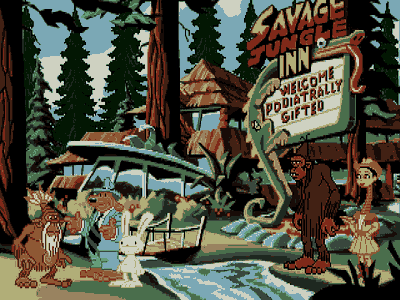 Lucasarts was the master of many of the "peaked" genres.
Lucasarts was the master of many of the "peaked" genres."Point and click" adventures of the nineties are an obvious example. They used to be one of the key, defining genres of PC gaming. Nowadays they are so "underground" that when people talk about "adventure" games, they usually mean third-person "action-adventure".
Technologically, they fit perfectly both the form factor and the limited computer graphics of the era. It is true that realtime 3d graphics of today's gaming systems can create more immersive scenes, but it's not a defining feature, it doesn't make modern productions qualitatively better.
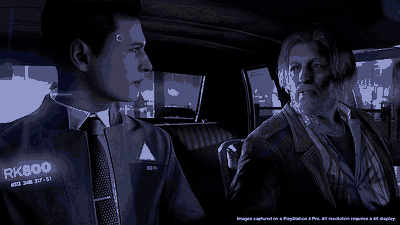 Quantic Dreams use state of the art 3d to great effect, but writing is what makes the difference...
Quantic Dreams use state of the art 3d to great effect, but writing is what makes the difference...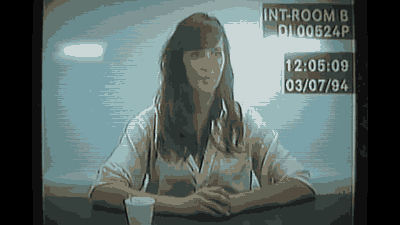 Sam Barlow's use of FMV could not have been done in the nineties - but the games likely would work the same even as text adventures!
Sam Barlow's use of FMV could not have been done in the nineties - but the games likely would work the same even as text adventures!Culturally, they were about characters, storytelling, mystery, and puzzles - things that we evolved through millennia, and have not seen a significant language shift. Yes, certain early computer implementations of the concepts were less than ideal, with the notorious "pixel hunting" items or random deaths, timed puzzles, or other abstruse ideas - but game developers quickly learned (at least, the best of them) to avoid these cheap tricks.
Hardcore RPGs (yes, I don't think the success of Baldur's Gate 3 counts as a renaissance of the entire field), strategy games, most "simulation" games (e.g. space, flight, city), the list is long when we consider what fell off the mainstream. But note that not all cases count as having "peaked" - because the other conditions might not apply.
Other examples.
But once you start thinking about the concept, it's not hard to find many other cases.
One could argue that well, personal computers are past their peak! In the early days, a family bought a computer for the home, and the first applications were productivity ones. Word processing, spreadsheets, databases, "personal information management" - basically, all the things that Microsoft intuited and dominated.
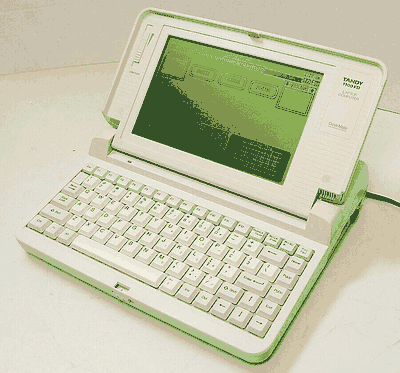 Tandy 1100fd. A budget 8mhz v20 (8088), 640kb of Ram early 90ies laptop. DOS and productivity SW on Rom. Boots in 3 seconds, and arguably is a better word processor than most of contemporary machines.
Tandy 1100fd. A budget 8mhz v20 (8088), 640kb of Ram early 90ies laptop. DOS and productivity SW on Rom. Boots in 3 seconds, and arguably is a better word processor than most of contemporary machines.This is not the role of the computer anymore. Computers are disappearing from homes. If you need one, it's likely a laptop. If you already do enough typing at work, you might not even own one of these. You might be happy with your TV, your phone, or perhaps a tablet. A console if you're into gaming.
You might have particular needs and own a workstation, or a gaming setup, but these are relatively rare, and not on the rise.
 The BBC Micro - arguably the best educational computer ever made? In general, the idea of "end-user programming" is gone. We don't live in Smalltalk-land. See also: https://www.bbcmicrobot.com
The BBC Micro - arguably the best educational computer ever made? In general, the idea of "end-user programming" is gone. We don't live in Smalltalk-land. See also: https://www.bbcmicrobot.comBrowsers. Terminals. Enough power to share the load, and reduce latency, but effectively not "personal" machines, and definitely not personal productivity ones!
Ironically, the convenience of personal computing power killed the world of dumb-ish terminals, time-sharing, and all the social islands that existed within each multi-user unix mainframe - only to organically re-emerge in today's dominance of always online computing.
This is unsurprising, as the underlying mechanism is grounded in human needs (and thus, much more resilient than technological trends), but it meant we went from nicely designed systems created from the ground up around the idea of sharing computation and networking users, to the beastly abomination of today's ad-serving, always-tracking, energy-wasting, service-oriented internet.
(sad) Predictions?
The demise of single-player gaming has been foreshadowed for a while now.
Truth is, it will never die. And at the same time, it's already dead! Remember, things don't "die" in the sense of completely disappearing. Vinyls are on the rise! Doesn't mean that they aren't well past their prime, and destined to never be dominant again.
Question is. Is it nearing its peak?
 I'm sure there are still a few songs to be played... But is "the last of us" a title fitting for its role in the industry?
I'm sure there are still a few songs to be played... But is "the last of us" a title fitting for its role in the industry?When I played TLOUp2, as an (ex-)game developer, my tears spilled for two reasons. Some for the plot. But others due to the sense of witnessing the heroics of a large team of the best craftsmen in the world, pouring their art in each nook and cranny - only to disappear when all it's said and done, in the long list of credits. It is almost immoral to be able to purchase it - it belongs to a museum!
I consider it to be the epitome of the Western AAA blockbuster game. Sony is the last remaining publisher that is willing to bankroll such immense efforts, and they can, because they want to establish (and profit from) a platform, not just sell copies of the game.
But even with that being true, and even if they are trying to expand these games into bigger franchises by leveraging the IP in other media, and monetize more with sequels and remasters, smart money would bet on that not being enough to justify the costs, and the relatively smaller appeal. TLOU will hardly ever have the reach of a Fortnite...
 I don't now if there is any IP that did not land of Epic's epic...
I don't now if there is any IP that did not land of Epic's epic...As a whole, I don't think single-player games have peaked - when we look at the "game of the year" they are mostly single-player experiences and they are better, year over year. This is because we are both still learning and evolving their language, and technology is not yet entirely irrelevant - it still has some room to make qualitative differences in the end product, and even more in the production pipeline.
But the kind of immense, supremely polished, finely chiseled experience that TLOU represents, might have. After all, we can't quite build cathedrals like we used to, anymore.

Windows itself, the king of PCs, might be at its "peak". Being an OS, certain changes force updates (Dx12...), and it is still getting better. But clearly, it's not as important anymore, there are no OS wars, no competition, no incentives.
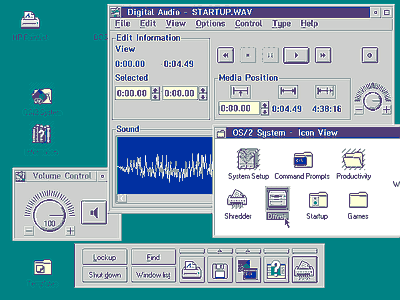 A better Windows than Windows.
A better Windows than Windows.Mac and OSX is the only ecosystem that remains "clean" and pure, because of the tight relationship of Apple's hardware, software, and content distribution. Like Sony, it cares about the polish, it makes sense to invest in things that are not immediately linked to profit because they benefit the ecosystem as a whole.
Microsoft failed to make its store(s) relevant, and managed to tarnish the reputation of its own hardware with some truly horrible first Surface models, and cheap imitations of the Apple stores.
Thus now Windows lives in this weird space where it adds both great niche features for nerds (WSL...) while at the same time pushing ADs on the lock screen, quickly turning Edge into malware (look at the settings!), and pushing AI everywhere.
It used to be that the discerning buyer of a Windows computer needed to reinstall the OS, to purge whatever malware the hardware vendor added. Now, it's bundled right into the OS, and this trend will surely continue.
 AI is here to stay. But OS used to be a more serious business than a vehicle for whatever random hype idea.
AI is here to stay. But OS used to be a more serious business than a vehicle for whatever random hype idea.On a personal note, this affects me as well. Not in a bad way, necessarily - the relative scarcity of the skills I acquired in my career, coupled with the fact they are still in demand, makes this line of work not the worst choice. Probably it also helps that I have always been intellectually curious, and believe in having both breadth coupled with a few areas of depth...
But I always had a sense of this shift of focus happening. Of the strongest correlation between $ and coding skills moving elsewhere - and with it, the rate of innovation in the field.
Carmack ('s era) was the peak of influence a rendering/systems/low-level engineer could have in gaming.
C++, gamedevs all lament, is slipping away from "us", and why would it not? There is no competition in native development tools in general, Visual Studio is quickly losing ground to VS.Code (someone called the former VS.Native at work lately).
And yes, I know about Rust, and everything else you might be thinking of (I've always been a language nerd), all things that are either "indie" or primarily motivated by the web.
Again, I don't mean to close on a lament, quite the opposite, I think exploring "peaked" technologies is great! One can learn, perhaps revive. Worst-case, they are great as they relieve any "upgrade" anxiety, they represent a stable, immutable point in computing history!
 True mastery requires stable foundations. That's why the c64 is the pillar of the demoscene (imho).
True mastery requires stable foundations. That's why the c64 is the pillar of the demoscene (imho).

